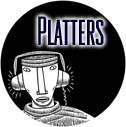
Comment
on this story
|
 |

This Week: Douglas plays in the studio, Taylor takes the lead, and scolohofo seduces
Dave Douglas
Freak In (Bluebird)
It ain't easy being a Dave Douglas fan, as followin' his muse is one vertiginous ride, full of twists, air pockets, sudden full-stops, and demanding accelerations. If author Robert Jourdain has it right and the appreciation of music "commences with a kind of fleeting hypothesis that is confirmed and disconfirmed, every mismatch countered by adjustments to the next anticipation," Douglas demands of his audience adjustments of a tectonic magnitude. Freakin' indeed.
On this latest recording Douglas steps away from the conventional instrumentation of The Infinite, his Grammy-nominated previous effort, and into the studio to incorporate computer-based treatments on 12 new tunes. As a result, each selection is a synthetic confection, complete with loops, edits, computer-generated whines, blurps, reverb, etc., remixed with keyboards, guitar, percussion, bass, trumpet, and horns.
Despite the unconventional sounds, lyrics proclaiming "it's artificial; that's why we like it," liberal use of drum machines, and other genuflections toward the robotic and automated, this disc has anything but an artificial feel to it. Representative is the ballad "November," where the digitization is confined to rhythm effects moderated by tabla, and the warm melodic line is shared between sax and muted trumpet. Or "Porto Alegre," whose calculus includes everymom's voice, digitally embedded with vinyl-like scratches, singing "this is not a business message, this is not a fax, this is just a greeting on your birthday...." Even on the less temperate cuts, Douglas' consistently captivating melodies and his delightfully faltering trumpet lines imbue an organic and near homey feel, full of surprises, most of them welcome.
—Jonathan B. Frey
John Taylor Trio
Rosslyn (ECM)
British pianist Taylor ought to lead his own dates more often. His key sideman roles with the likes of Peter Erskine and Kenny Wheeler are remarkable, but Rosslyn is a more candid listen to this underrated artist. Taylor's music—so consonant and relaxed on the surface—is of a rare strength and depth, creating its own emotional space.
The closed harmonic circuits and sparse melodies of "The Bowl Song" and "Between Moons" set up Taylor's improvisational approach, which relies as much on rich chordal detours as it does on finespun solo lines. His pace and touch are masterful on the hypnotic, vamp-based title track, and his swinging inventions on the sole standard "How Deep Is The Ocean" brighten the song anew. A couple of tunes by Wheeler and Ralph Towner give bassist Marc Johnson and drummer Joey Baron the chance to step up; both players otherwise stick to the less-is-more theory of accompaniment.
The final Taylor original, "Field Day," is the album highlight—an effortless stroll through bright modulations and subtle rhythmic shifts. It's an uplifting piece, thanks again to Taylor's deft phrasing and creative harmonic thought. Not only is the music on Rosslyn beautiful, but it's recorded with as much clarity and presence as any ECM disc to date.
—Chris Mitchell
scolohofo
oh! (Blue Note)
Contrary to the title's exclamation, oh! is less a surprise than a seduction. There's no way that Scofield, Lovano, Holland, and Foster can surpass the anticipation their collaboration creates; hence, expressions of astonishment are all but out of the question. Indeed, reminiscent of a notable Burton-Corea-Metheny-Haynes-Holland summit a few years back, there's actually a cool efficiency about these proceedings.
Cool as in unruffled, not as in chilly. In fact, selected tunes herein are remarkably hot, most especially Lovano's "New Amsterdam" which, for reasons that could only be related to thematic development arresting the listener's immediate attention, is nestled deep in the middle of the disc, cut six. At 12-plus minutes, it's easily the longest tune here and a deceptively simple vehicle for Lovano's imagination on tenor. Natch' the support provided by the band is equally noteworthy, with Foster/Holland providing pervasive rhythmic drive and Scofield's guitar acting as Lovano counterpoint. Risking neglect owing to its subtlety and location, "New Amsterdam" is a marvel of invention and individual ego subjugation.
Defying expectations in other respects, this is neither a Scofield nor a Lovano recording. There are moments, on "Right About Now" and "Dawn of Time," when the affinity Lovano and Sco share recalls their early '90s Blue Note discs. Fortunately, those were particularly propitious times for both, worthy of being revisited; more fortunately however, Holland and Foster, fifth columnists, masterfully undermine any nostalgic reunion collusion. Furthermore, Sco's recent experiments in garage band funk have done him good, as he sounds especially fresh, having discovered new lines to mine during the interlude. In sum, a recording that bears listening to, repeatedly.
—Jonathan B. Frey

April 3, 2003 * Vol. 13, No. 14
© 2003 Metro Pulse
|